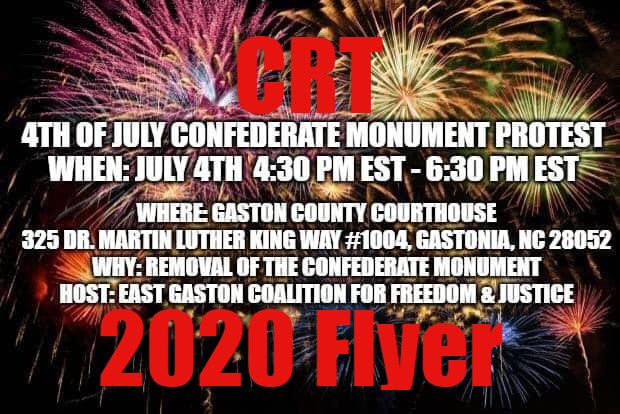
BTR News – Critical Race Theory, North Carolina and Confederate Monuments
Podcast: Play in new window | Download (Duration: 4:55 — 2.3MB) | Embed
Subscribe: Amazon Music | iHeartRadio | Email | TuneIn | RSS | More
By Scotty Reid – It has been one year since protests against the “Confederate Heroes Monument” were ignited by the murder of George Floyd by a former police officer named Derek Chauvin. On July 4th, 2020, a national holiday that celebrates the independence of American colonists from the British Crown leading to the founding of the United States, that a racially diverse group of Gaston County activists staged dramatic readings of speeches against slavery by past abolitionists, black and white, at the county courthouse under the specter of a Confederate monument.
The intent of the organizers, an informal group called the East Gaston Coalition for Freedom and Justice was to highlight the hypocrisy of celebrating “freedom” while depriving people of their freedoms based solely on their skin color and origins. The event was used to teach attendants that the 13th Amendment of the U.S. Constitution technically did not end slavery but merely created a new form called prison slavery and how laws were passed collectively known as the Black Codes in the South in order for the former Confederate states to re-enslave former victims of plantation slavery and their descendants by way of “Convict Leasing” a prison practice that continues to this day. Currently, there is a Congressional resolution to remove the slavery loophole in the 13th Amendment called the “Abolition Amendment”.
Unbeknown to the organizers of the July 4. 2020 protest/teach-in, we were engaging in what today would be labeled Critical Race Theory, which is a niche field of academia where a small group of legal scholars and thinkers analyze the intersection of race and law.
Critical Race Theory has been around since the 1970s and became a movement started by a small group of U.S legal scholars but in the year 2021, after all these decades, censoring this research has become a cause for dishonest politicians and their followers.
Considering all the arguments being made by conservative politicians and those who repeat the false narratives used to censor an area of academic research, it is important to sort out the facts.
According to scholars that study Critical Race Theory, it describes the diverse work of a small group of scholars who write about the shortcomings of conventional civil rights liberal approaches in addressing systemic racism in the United States. Critical Race Theory pushes back on the liberal argument that promoting “color blindness” is all that is needed to push the nation forward towards a more equitable society for all. Interestingly some of those attacking the field of study who are not liberals, in their arguments are claiming they don’t see color as they absurdly claim that CRT teaches black people to hate and physically attack their white neighbors.
The public has been gaslighted into believing that CRT is part of the K-12 school curriculum when in fact is a voluntary course offered by just a few universities. The controversy is wholly manufactured by those that want to distract from real issues plaguing the masses of people in the United States, including the issue of prison slavery affecting all people, no matter their race, sex, gender, or national origin.
Despite the ban on Confederate monuments in North Carolina by the state’s constitution, a Republican legislature pushed through a state law banning the removal of Confederate monuments and signed into law by a Republican governor in 2015, an occurrence that is a perfect candidate for CRT study. While conservatives seek to ban CRT, it should be noted that they more than embrace the “Lost Cause” mythology that seeks to revise the history of the main cause of the Civil War, the perceived abolishment of slavery with the election of Abraham Lincoln.
The movement to ban CRT is really just the latest strategy by Republicans who have taken it upon themselves since the 1970s to defend the racist legacy of the Democrat Party of the 1800s and 1900s. It is an anti-intellectual movement built on lies meant to polarize the nation. The Gaston County “Confederate Heroes Monument” is why we need people to critically examine and analyze the intersection of race and law.